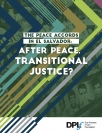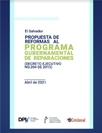El Salvador has been a key country for DPLF’s work since the beginning. This organization was founded in 1997 by Professor Thomas Buergenthal and his colleagues from the El Salvador Truth Commission -promoted by the United Nations-, who asserted that human rights could only be guaranteed by an independent and strong judiciary. Since then, our work in that country has been based on the idea that the impunity of past crimes significantly impacts any aspiration to dignify the victims, consolidate democracy, and recover safety.
With that conviction in mind, this microsite was created to follow up the historical moment that Salvadoran society is experiencing from two different perspectives: on one hand, the post-conflict agenda, and on the other hand, the obstacles that are currently faced by the country in terms of citizen security, human rights, and independence of its justice institutions.
In 2016, after decades of an absence of the political will to recognize the crimes that occurred during the armed conflict (1980-1992), we finally witnessed the declaration of the unconstitutionality of the Amnesty Law, which prevented victims from attending tribunals in order to demand justice. After the judgement, some of these trials have resumed and Salvadoran society is vigilantly waiting for the resolution of each one.
Coupled with this, on the 21st of August, 2017, the National Commission for the Search for Disappeared Persons in the context of the armed conflict in El Salvador (CONABUSQUEDA) was created. We believe that the national and international follow-up to these efforts will be crucial to ensure its success.
Likewise, we have not lost sight of the manner in which crime rates and complaints of human rights violations have escalated hand in hand in El Salvador. With more than 6,600 registered homicides, El Salvador became the most violent place in the world in 2015. This violence has been confronted by various “heavy-handed” measures and militarization, which are related to complaints of human rights abuses and extrajudicial executions by the police.
Undoubtedly, El Salvador is experiencing a serious security crisis; however, throughout the hemisphere, from Brazil to the United States and El Salvador, this experience has demonstrated the severe consequences of promoting, or at the very least tolerating, widespread police abuse and misconduct.
It is imperative that social organizations and government institutions strengthen themselves to overcome these challenges. Therefore, DPLF will continue to offer technical assistance, both to civil society and government agencies, in order to promote democratic values and respect for human rights in El Salvador. In this way, we can continue to move forward with this work.









